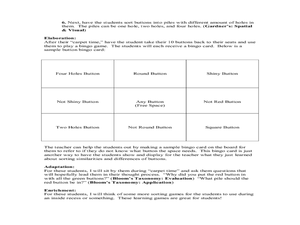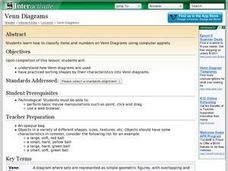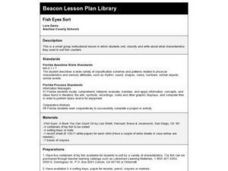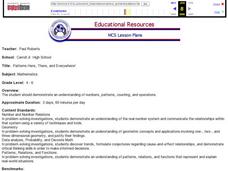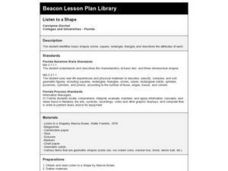Pennsylvania Department of Education
Shapes Around Us
Learners use manipulatives to study shapes. They sort shapes and use correct geometric terminology to describe them. Students find real-life examples of 2 and 3 dimensional shapes, and classify figures in their classroom according to...
Curated OER
Shapes in Our World
Help your students explore shapes. They classify shapes and identify them in their everyday world. Plane shapes are explored, and they classify and identify the plane shapes.
Curated OER
What's My Rule for Sorting?
Students view objects sorted by one characteristic and name that characteristic. In this sorting rule instructional activity, students explore to find a new characteristic and write a description of that rule. In early grades...
Curated OER
Sorting and Classifying
Fifth graders are engaged in sorting and classifying geometric shapes of various colors and sizes. They discuss the properties of these shapes and illustrate a range of classifications using Venn diagrams.
Curated OER
Shapes
Students identify attributes of different geometric shapes. In this geometry lesson, students view a PowerPoint presentation on shapes and use attribute blocks to examine the corners and edges of each shape. Students work together...
Curated OER
Sorting and Classifying Concrete Objects by Varying Attributes
First graders examine how to sort concrete objects by their attributes. In this sorting lesson, 1st graders listen to Gray Rabbit's Odd One Out by Alan Baker, and discuss the actions of the main character. They practice sorting objects...
Curated OER
Grouping Buttons
Looking for a good lesson plan on counting and sorting? This lesson plan is worth a look! In this classification lesson plan, learners sort buttons by color, shape, shiny verses not shiny, or number of holes.
Curated OER
Venn Diagram and Shape Sorting Lesson Plan
Students use Venn diagrams to represent classifications of shapes and to use counting arguments to find the number of objects in a given set.
Curated OER
Fish Eyes Sort
Learners sort, classify and write about what characteristics they used to sort fish counters.
Curated OER
Gummy Bear Sorting
Students demonstrate knowledge of sorting and classifying by color as they sort gummy bear candies.
Curated OER
Sorting Objects
Students sort objects by color. For this classification lesson, students identify the color of the objects and categorize them according to color.
Curated OER
Classifying Polygons
Seventh graders participate in a polygon hunt. In this polygon lesson, 7th graders examine how polygons are alike and different. Students create a Venn diagram and label the sorting circles. Students work in cooperative...
Curated OER
Small and Large Squares
Young mathematicians classify squares according to attributes. They sort squares according to specific attributes. Students explore squares in repeating patterns and order squares according to size. Engaging extension activities are...
Curated OER
Patterns Here, There and Everywhere
Pattern recognition is a skill often used in mathematics. Learners count and sort manipulatives, organize the data into a graph and answer questions about the information displayed. They collect the objects to be used and create patterns...
Curated OER
Make Your Own Shape Puzzles
Students create their own shape puzzles. They practice putting puzzle pieces together so they fit correctly. They classify and sort the different shapes as they finish the puzzle.
Ohio Department of Education
Describing and Creating Plane Figures - Grade One
Young mathematicians draw, create, and describe different shapes using triangles. They discuss attributes of the original and created shapes. Pupils classify the created shapes and draw and write in mathematics journals to communicate...
K-5 Math Teaching Resources
Triangle Pack
With so many different types of triangles, it can be a challenge for young mathematicians to keep them all straight. Luckily this set of printable triangles is here to engage children in comparing and sorting triangles by their...
Curated OER
Hardware Sort
Students classify various hardware items using the attributes of the objects. In this classification lesson, students group objects based on their attributes and explain their classification key.
Curated OER
Sorting
Students sort a variety of manipulatives and use a software program that provides more sorting practice.
Curated OER
2-D and 3-D Presents at Pedro's Party
Fifth graders draw 2-D and 3-D shapes. They sketch and label geometric figures with correct terminology, then explore parallel and perpendicular lines. Pupils sort and classify shapes drawn.
Curated OER
To Classify Beans And Peas
First graders record information on a bar graph and interpret the information given. They identify five different kinds of beans and three different kinds of peas. They work in groups of four and sort the beans by size or shape.
Curated OER
Listen to a Shape
First graders identify basic shapes (circle, square, rectangle, triangle) and describes the attributes of each. They use magazines to find examples of each shape, and then make a collage.
Curated OER
What's the Texture?
Students sort, classify, and write about how they sort a variety of shells.
Curated OER
Attributes and Patterns with Buttons
Students work with attribute buttons in order to sort, create, and analyze patterns. Students practice identifying patterns and verbalizing the sorting rules and patterns they used. Sample assessments and rubric are provided.






